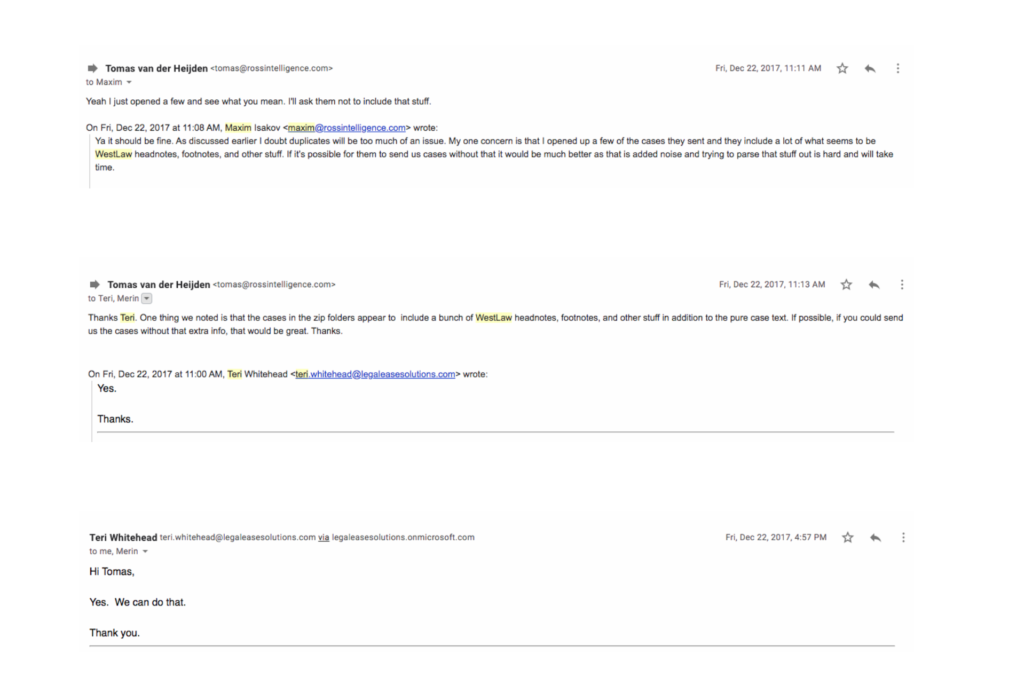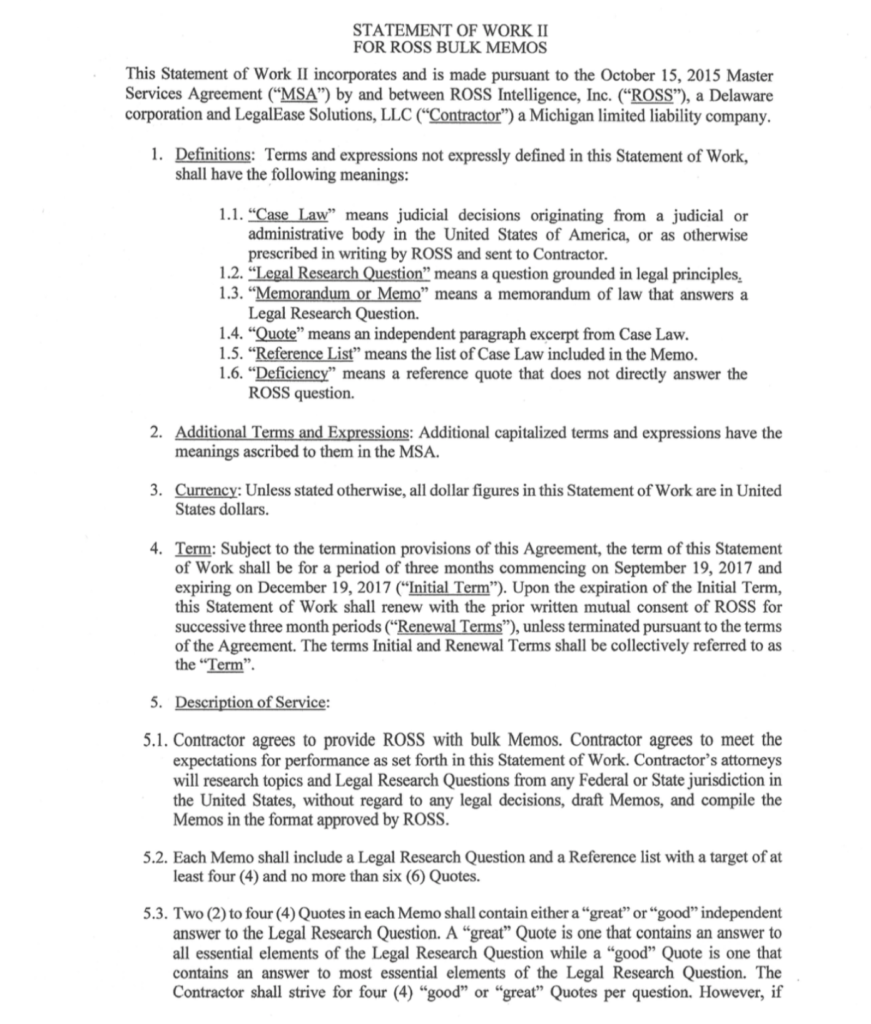
Below is a statement from ROSS Intelligence following the filing of a court case by Thomson Reuters (TR) yesterday, and responses to questions Artificial Lawyer put to the company this afternoon,
Andrew Arruda, co-founder of ROSS, told this site by email: ‘This lawsuit isn’t about proprietary data, it’s about protecting market share. There is not a single shred of truth to what TR has alleged and our posts illustrate that with irrefutable proof.’
—
Artificial Lawyer also asked Andrew Arruda a few questions about this and here are his responses:
Given the evidence you have provided, how did it get to the point that TR is taking you to court?
As a part of its suit against LegalEase, Westlaw subpoenaed us for all communications, agreements, and work product related to the claim. Westlaw and their attorneys were unable to find any evidence that we used or benefited from Westlaw’s data. So why file this suit? Fear of competition. This is not the first time Westlaw has used litigation as a weapon. By filing this lawsuit despite its lack of merit, Westlaw is interfering with our chances of securing more funding or merging with other companies, which we need to do in order to innovate and compete with Westlaw.
We just asked for LegalEase to conduct legal research and provide us with case law — which is free from copyright. We didn’t want or need any proprietary material.
– Do you think it’s unhealthy for there to be so few legal data companies in the market?
The law isn’t copyrightable. But to be used in a democracy, it also needs to be accessible. To quote that recent Supreme Court cases again, “’Every citizen is presumed to know the law,’ and ‘it needs no argument to show… that all should have free access’ to its content.” The legal research market has long been dominated by Westlaw. To the extent that they are preventing access to the law, that is unhealthy.
– If all court data was free and online and easy to access, do you think situations like this would still happen?
Our hope is that situations like this do not happen in the future. There are many organizations and companies that share our mission to democratize the law — to make it free, online and easy to access.
—
Statement from ROSS Intelligence (reproduced here).
Yesterday, Westlaw filed a suit alleging that ROSS stole its proprietary data to fast-track our technology development. These allegations are false. We did nothing wrong. Below, we release internal communications, agreements, and work product related to Westlaw’s claims. It saddens us to be writing this piece, taking away our focus from delivering useful features to our customers.
In 2017, we started work with a contractor called LegalEase to build datasets to train our artificial intelligence (AI) systems. We needed legal questions mapped directly to passages from case law that answer those questions. It was crucial that the passages mapped directly to case law in our database because we wanted to teach our system to give on-point answers directly from primary law.
In 2018, Westlaw filed a suit against LegalEase claiming that LegalEase gave us proprietary data in the form of headnotes, case summaries, and other editorial content. We never asked for or used proprietary data from Westlaw. Not only could we not map this proprietary data to the case law in our database, our technology does not attempt to generate editorialized answers; instead, it aims to recognize and extract answers directly from case law using machine learning. In fact, anyone that accesses our platform (which is freely accessible through our website) can readily see that we have no editorialized content. It has always been our view that the editorialized content approach, in addition to being fallible and difficult to quality-check, produces work that is stale the moment it is published. That is the old legal research playbook. We chose a new way.
In fact, when LegalEase did once send us unsolicited Westlaw content, we immediately told them to not include such proprietary information. You can see this in the emails provided below. The first email is from one of our engineers who discovered the data, alerting the project lead. He said, “…they [LegalEase] include a lot of what seems to be Westlaw headnotes, footnotes, and other stuff. If it’s possible for them to send us cases without that it would be much better as that is added noise…”. The second email is from our project lead to our primary contact at LegalEase about the unwanted data. We were very clear: “if you can send us cases without that extra info, that would be great. Thanks.”

As a part of its suit against LegalEase, Westlaw subpoenaed us for all communications, agreements, and work product related to the claim. Westlaw and their attorneys were unable to find any evidence that we used or benefited from Westlaw’s data. Below you can read a complete copy of the statement of work related to this matter. No matter; we had to spend over a hundred thousand dollars to comply with this subpoena. As a young company, this was a financial blow, which we are sure was not lost on Westlaw’s executive team.

Fast forward to earlier this week: we received notification that Westlaw had settled with LegalEase. We thought this costly distraction was behind us, but today we are back to square one. We opened Law.com to learn that Westlaw had filed a suit against us. That Westlaw notified the press before us is disappointing.
Since the founding of ROSS Intelligence, we have had one mission: to democratize the law through better legal technology. We recognize that for decades the legal research market has been dominated by Westlaw — with its bloated, expensive, and unintuitive products that provide bad results. We knew there was a better, and more affordable, way. Over the last five years, we have made tremendous progress. We’ve spent over a million dollars building our database of primary law from data partners such as Casemaker and Fastcase. We’ve innovated new tools and better ways of searching. We’ve signed up thousands of lawyers and law firms. And we’ve partnered with companies like Clio and Bar Associations across the United States. By filing this lawsuit despite its lack of merit, Westlaw is interfering with our chances of securing more funding or merging with other companies, which we need to do in order to innovate and compete with Westlaw. This is not the first time Westlaw has used litigation as a weapon.
We were one of the first donors to the ABA’s Center for Innovation because their mission deeply resonated with ours. They believed that the intersection of law and technology affords the profession a tremendous opportunity to reshape both the delivery of and access to legal services for the 21st century. We are asking our friends and supporters in the legal community to help us fight this unfair attack and allow us to continue building products lawyers love. We believe that better legal technology can enable better access to justice at its core.
So, here we are. A small company versus a juggernaut. David versus Goliath. This litigation epitomizes everything that is wrong with Westlaw’s business practices. Having done nothing wrong, unless case law is copyrightable… Of course, it is well established that primary law is not copyrightable in the United States. As has long been held and as the Supreme Court reminded us last week, “no one can own the law” (Georgia v. Public.Resource.Org, Inc., №18–1150, 590 U.S. ___ (2020)). Individuals must have free access to the law if American democracy is to survive. We will continue to fight for free access to the law and look forward to showing the world Westlaw’s true colors.
If you want to get involved in this fight, email us directly at thelawisfree@rossintelligence.com.
Thank you for reading.
Andrew Arruda and Jimoh Ovbiagele
The original article is here:
While it is true that “no one can own the law,” the elephant in the room is not about whether the law (or written opinion in general) is copyrightable. From the complaint, TR’s primary allegation is that ROSS used a third party (LegalEase) to “sniff” into Westlaw and impermissibly downloaded all the cases that Westlaw collected over the years. I can only assume (which could be wrong) that ROSS did not have the means by which to retrieve these cases from courts or PACER, or in the alternative, did have the means but just did not want to incur hefty fees in doing so (which could break a startup or divert critical resources from other business areas of focus). But that is besides the point. To design around this hurdle, ROSS sought out LegalEase to do the deed. Since LegalEase settled with Westlaw and agreed to be permanently enjoined from using Westlaw to siphon Westlaw’s data (which includes cases and keynotes), this seems to reinforce the issue that LegalEase stipulated to doing the deed for ROSS.
I would not call this case one of David v. Goliath. After all, Goliath was biblically portrayed in the negative light and defied the armies of God. TR is a Fortune company with insane capital but TR did not challenge ROSS to a duel; quite the contrary, from the complaint, it appears that ROSS, the small bully, is trying to bully someone bigger than it. Once all the facts come out, we should have a better picture as to what really happened behind the scene.
Outside of the copyright issues, it is a little ironic that ROSS essentially hired a research firm to run westlaw searches on legal questions to create data sets that it’s own research platform would use to answer legal questions.